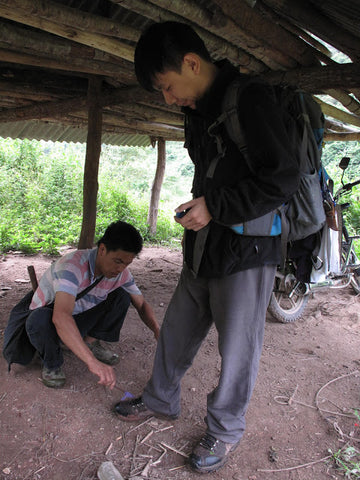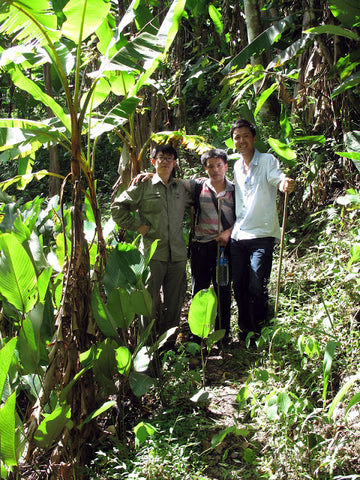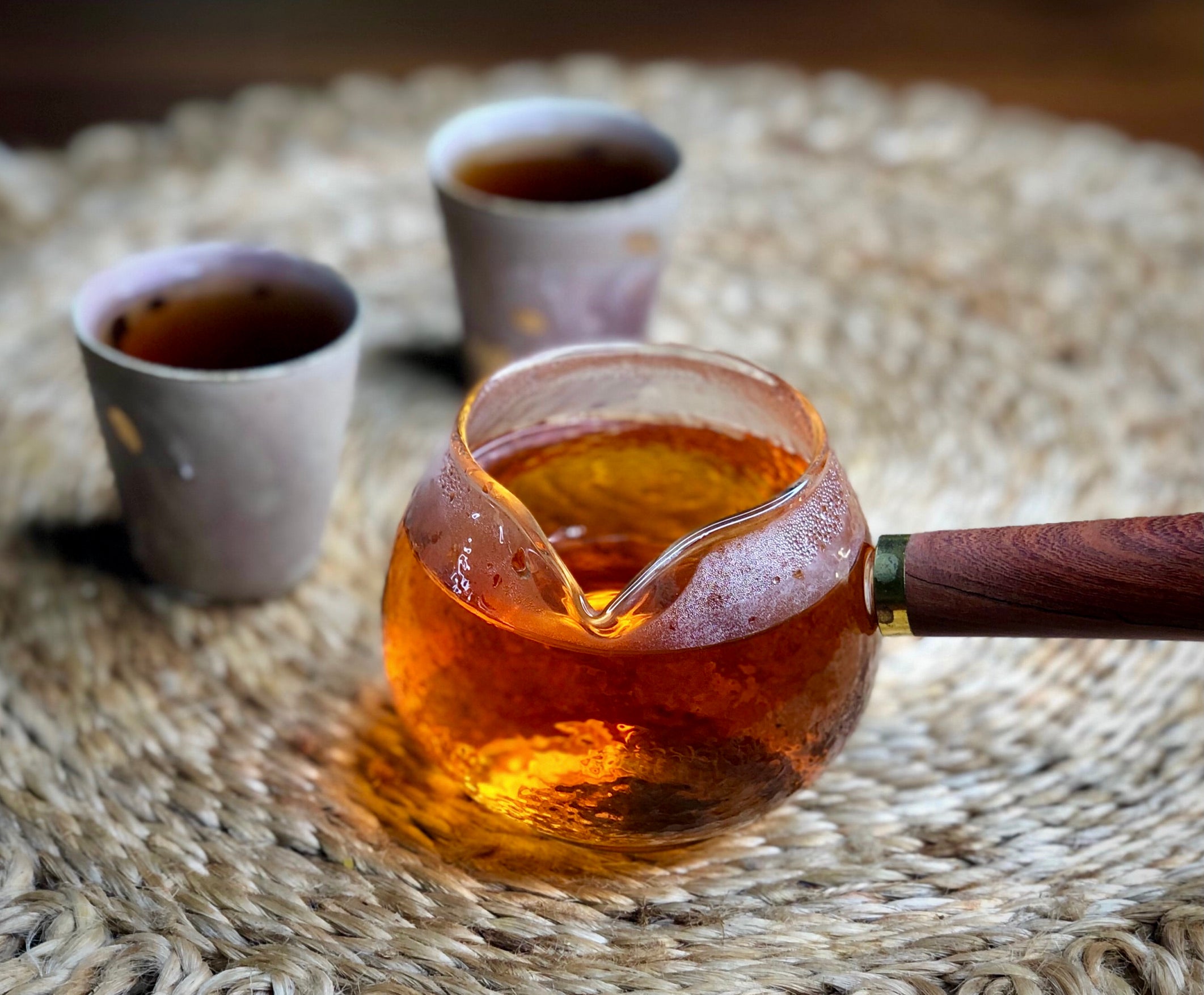
Gua Feng Zhai 刮风寨
Gua Feng Zhai is the most remote village in Yiwu. The first time we tried to visit, heavy rains had closed the road for a week. The only way through was to ride pillion on a motorcycle. On our second attempt, we still had to wait 3 days for the road to dry, even though we had a four wheel drive pick-up truck, the risk of getting stuck was too high.

Clearing a fallen tree that had blocked the road
The journey takes about 3 hours, mostly because the terrain is so mountainous, and the unsurfaced road is little more than a muddy track in places. The road is cut into extremely steep, forested slopes, exposing soft clay topsoil which collapses easily, in gigantic sheets of rubble.

Water flows over the road, not under
In one section, the recent rains had eroded half the road away. The river below was choked red with rocks & clay sediment from the runoff.

A thousand butterflies 一千蝴蝶
White & yellow butterflies clustered on the wet ground around salt licks, flying up into the radiator as we drove by. “Our Gua Feng Zhai bing should be called 1000 butterflies” I thought, keeping a grim death toll as we scattered cloud after cloud of the delicate creatures.

The village of Gua Feng Zhai, along the Laos border with China
The village itself is the largest in Yiwu, over 100 households, spread out at the end of a valley. Paddy fields line the river, where children bathe in the shadow of a sturdy rock bridge. Black haired pigs wander around the town, wallowing in its muddy streets. Some say it is these free range pigs who give the village it's characteristic smell, and inadvertently scent the tea produced here. The Han Chinese in Yiwu, who keep their pigs locked up in pens, joke that this is what is meant by "GuaFengZhai's unique style of processing." Although it also refers to the fact that the Yao tribe are relatively new to tea-making. They are the lucky inheritors of ancient tea trees planted by previous inhabitants of the area.

Pigs basking? Or scenting tea?
Gua Feng Zhai is mostly populated by Yao minority people. The powerful chaqi of Gua Feng Zhai tea has brought wealth to the village, especially since the road was opened in 2001. The villagers of Gua Feng Zhai are relatively well off compared to the Yao people living on the Laotian side of the border. The border is only 30 minutes walk away, and it is not uncommon for the men to cross over to find wives or go hunting. Their black and white head gear denote who is from Laos and who is not.
Although some still live in rudimentary wooden huts, most are now building brick houses with fibreglass roofing. The number of vehicles parked outside are an indicator who has the good tea and who doesn't. Most have 1 or 2 motorcycles, an industrious few have pick up trucks.
The Laotian village of Jie Bei is the nearest town, just 5km away. On the Chinese side, Mahei is the nearest town at 22km away. But if a villager falls sick, they have to go to the clinic in Yiwu for treatment, 31km away. Before the road was opened it used to take 3 days. Electricity only arrived in 2004. They still don't have mobile phone reception.

5 year old tea tree, GuaFengZhai village, Yiwu prefecture
The young tea trees which grow around the village are only 5 years old. They are surprisingly tall & robust for their age, with trunks already 15cm in girth, because this region is blessed with especially rich red earth, abundant sunlight & rainfall. Best of all, they are unpruned, which contributes to the unfettered wild spirit of the tea. But they are still just "xiao shu" - small trees. It will take many decades for them to command the $175/kg price that Gua Feng Zhai is famous for.
The famous gushu tea trees of GuaFengZhai are located in 3 separate locations deep inside the community forest. These 3 ancient plantations are called Cha Wang Shu, Cha Ping, and Bai Sha He, the nearest is 3 hours walk away. The difficulty of accessing these trees helps to justify Gua Feng Zhai's premium price, the highest in Yiwu.

Applying leech deterrent
Our supplier Mr. Ma, took us hiking in the forest to see his tea trees at Cha Ping. First we had to apply a chemical treatment to our shoes, to protect us against the thin blood sucking worms which the locals call 蚂蝗 “ma huang.” Even as we were applying the foul smelling deterrent, we found some ma huang already wriggling up our boots.

Can you see the path? Neither could I.
In this tropical climate, plants grow up to neck height. We tramped through muddy beds of reeds & stinging nettles. I slipped and fell several times, and barely an hour in, my arms were already covered in welts & stings.
Two hours in, we had climbed to the top of the first mountain, but I was already out of breath and drenched in sweat. Flies & wasps, attracted by the salt, buzzed around me. My head pounded from the high altitude, but it was clear Mr. Ma was used to keeping a much faster pace. Despite being a chain smoker, he had barely broken a sweat. We joked that he could catch a wild monkey by chasing it to death.
“How much further to go?” I asked feebly, swatting away the insects.
“At this pace, we won’t be able to walk out before it gets dark” Mr. Ma said without hubris, puffing keenly away at his cigarette.
To make Gua Feng Zhai gu shu, you have to surmount 3 mountain peaks & valleys, just to get to the trees. So valuable is the harvest, that there have been fights between Yao tribespeople from LanTian & DingJiaZhai over tea stealing. Mr. Ma has built a shelter amongst the trees so he can fry the leaves and process them into maocha, sun drying them in a clearing, before walking back to the village the next day. He carried the building materials in himself - the tin roofing alone weighed 40kg. Mr. Ma is a strong man, and dedicated to being the best maocha producer in Gua Feng Zhai. He is also blessed to have some of the best trees, buried deep in the forest though they may be. Last year his crop fetched $40,000 US dollars, a small fortune in this part of the world. He is one of the 8 families in town that can afford a pick up truck, and is able to send his 3 sons away for schooling in Mengla & Yiwu. A lucky man indeed.

With Mr. Ma on the track to Cha Ping
Whilst I caught my breath, Mr. Ma used his machete to chop some bamboo into a walking stick for me.
“Watch out for tiger” he said ominously, whilst passing me the bamboo stick. Two Miao tribespeople were recently killed by a tiger at nearby Meng Xing. The goverment gave their families RMB 10,000 compensation (around $1,500 USD). It was also rumoured that tiger tracks had recently been spotted following human tracks at ChaWangShu.
“What should I do if we see a tiger?” I asked
“You should run” he said, with an amused look on his face.
“What will you do?” I asked.
“Hit it with this!” he laughed, brandishing his bamboo stake. “A tiger is worth a lot of money!”

